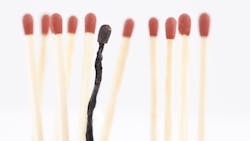5 things every dental hygienist should invest in to avoid burnout
Being a dental hygienist taxes our physical and mental well-being. We are both contortionists and counselors. People often dislike coming for dental care and consciously or unconsciously take it out on us. This can drain our energy and our sense of purpose.
For many, it’s not just employment that can be physically and mentally draining. Add in raising children, taking care of aging parents, or dealing with our own health challenges—sometimes all at the same time. Therefore, it is no wonder that many feel burned out at some point in their career.
Making ourselves a priority is often a challenge when balancing work and home life. Yet, being proactive can help ensure career satisfaction and longevity. Here are five things that every dental hygienist should consider investing in to avoid burnout.
Lifelong learning
Yes, most of us need continuing education for licensure renewal. It can be easy to take courses that are “convenient,” in yoga pants in front of our laptop, or one that fulfills a licensure requirement. At least once a year, it is important to get out of our comfort zones.
Many dental hygienists have found that attending conferences such as RDH Under One Roof, the ADHA Annual Meeting, or their state dental hygiene symposium helps give them a renewed sense of purpose and enjoyment. Learning and interacting in an environment that is focused solely on dental hygienists can help remind us of the value and importance of what we do.
Learning doesn’t have to come in the form of a continuing education credit course. Podcasts, such as A Tale of Two Hygienists and the Dental Podcast Network’s Channel, are great ways for hygienists to learn from one another and stay energized. Not everything needs to be about dental hygiene. There are traditional books, audio books, TED Talks, and more that can provide nourishment to the mind and soul.
Many dental hygienists have thought about pursuing a bachelor’s or master’s degree. For those who want to expand beyond the clinical setting, earning an advanced degree is the ticket that can get you to the next level. Whether you focus on dental hygiene, education, business, or public health, working on a degree is life changing. Very few things can compete with the satisfaction and confidence that comes from knowing that you had the grit and wherewithal to complete a degree.
Being a part of the dental hygiene community
Dental hygiene can be isolating. Even when we work with other hygienists, the busyness of the day can limit our connection time. It is one of the reasons that many find social media so attractive. It allows us to connect with people like ourselves. While Facebook and Instagram are part of the fabric of life today, cultivating close friendships face-to-face results in greater social satisfaction and well-being regardless of age.
Constituent and component dental hygiene associations and study clubs are excellent ways to meet colleagues and develop friendships. Taking a bigger step and volunteering with these groups help us see the larger picture of our profession. Belonging to our professional association can give us a sense of ownership and empowerment over our career that is sometimes missing from the private practice setting.
Personal health and well-being
Not only do we need to nourish our minds, but we need to take care of our bodies. When we have extensive work and family obligations, it can be easy to put ourselves at the bottom of the list. Putting off regular check-ups and screenings, being sleep deprived, not exercising, or eating a poor diet can put us at risk for health conditions, interfere with the quality of our lives, and even shorten our careers.
If regular exercise is not a part of your lifestyle, adding even 30 minutes most days of the week can boost overall health in a number of ways. Being physically active stimulates dopamine, and this can help improve mood. Exercise contributes to increased energy and better sleep. Working out regularly can help us take a more health-conscious focus, leading to better eating habits as well as greater awareness and knowledge of our bodies.
Downtime
In our 24/7/365 world, leisure time can be considered frivolous or wasteful. Nothing could be further from the truth. Unplugging, slowing down, taking some alone time, and enjoying family and friends help us find perspective and restore balance to our lives. When we look at our need for downtime, it’s important to think about unplugging from our devices. Whether you decide to do it for a few hours each day or by doing a digital detox, putting down our devices can help reduce stress, free up personal time, contribute to better sleep, and improve relationships.
Make a backup plan
Suppose that new job isn’t a good fit. Or your employer wants to change your pay structure or try to misclassify you as an independent contractor. What if your employer decides to sell the practice and retire or becomes ill and can no longer work? Or you become ill or disabled and can no longer work as a clinical dental hygienist? Most of us never see these situations coming. Do you have a plan?
Hygienists often have little or no job protection or recourse for action regarding employment issues. Therefore, it is vitally important to make sure you have all of the pieces in place to protect yourself and your livelihood. Two essential items are malpractice and disability insurance. Having your own malpractice insurance can protect you from lost wages and legal costs. It is also possible for suits to be filed once you’ve left a practice, so having your own is not a “nice to have,” but a must.
Regardless of age, all hygienists should purchase disability insurance. This type of insurance can be easy to ignore because it can come with a cost. Yet, suppose you are pregnant and require bedrest or you are in a car accident and can’t work. Or you need carpal tunnel surgery. Do you and your family have the financial means to survive an interruption in pay?
On the practical side, always make sure that you have a current résumé. There are excellent services, such as gethiredRDH.com, that provide a wide range of job-hunting services, including résumé development. Is there a dental hygiene temp agency or employment service in your area? If so, get to know them and make sure they have your résumé. Even if you are not job hunting, temping for them occasionally is relationship building and can come in handy in the unforeseen event of a job loss.
Carol Jahn, MS, RDH, has a Bachelor of Science in dental hygiene from the University of Iowa and a Master of Science in continuing education from the University of St. Francis. She has been a dental hygienist since 1982. Currently, she is the director of professional relations and education for Water Pik.
About the Author

Carol Jahn, MS, RDH
Carol Jahn, MS, RDH, is the Director of Professional Marketing and Relations at Water Pik, Inc. In this role, she is at the forefront of promoting the benefits of innovative dental technologies. She works closely with dental professionals to educate them on the advantages of incorporating these tools into their practice, ultimately improving patient outcomes and oral health.
